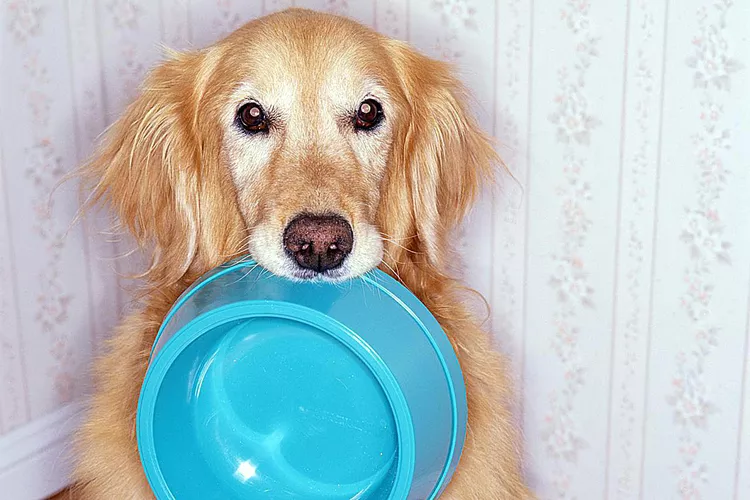Dog Food Basics

When it comes to feeding your dog, there are some decisions you need to make. Proper nutrition is one of your dog's basic needs, and it's about more than just the brand of dog food. Check out the answers to some basic questions many dog owners have about feeding.
What Type of Dog Food Is Best for My Dog?
Because there are so many commercial dog food brands available, choosing a dog food can be quite overwhelming. All commercial diets with the AAFCO label are considered "complete and balanced" for dogs. This means that the diet sustains life and meets a dog's basic nutritional needs for the designated life stage. However, not all dog foods are created equal. The quality of ingredients contributes to your dog's health and well-being.
When you are choosing the type of food to feed your dog, first narrow down your priorities:
- How important to you is it to feed natural, whole ingredients? If this is very important, look into natural or therapeutic veterinary diets. You may even consider a home-prepared diet (with guidance from your vet, of course).
- How much does cost factor into your decision? Natural and therapeutic diets are usually in the higher price range. If you are on a budget, you may need to find a mid-level food to feed.
- How much time are you willing to spend preparing the food? If you want to dedicate the time required for preparation, a home-prepared diet may be a desirable option.
Then, consider your dog:
- Overweight dogs or those with health conditions may benefit from special veterinary diets.
Choosing commercial diets: To determine which food is best for your dog, talk to your veterinarian first. Ask for input from dog professionals and even other dog owners. When in doubt, ask your vet for a referral to a veterinary nutritionist. Remember that opinions on canine nutrition tend to vary greatly.
Choosing home-prepared diets: Rather than choosing a commercial diet, some owners opt to go for homemade diets. If you try this option, make sure you work with your veterinarian to create a complete and balanced diet that is customized for your dog's needs. To begin developing a home-prepared diet for your dog, check out BalanceIt.com and/or PetDiets.com. Failure to feed a complete and balanced diet can lead to major health problems for your dog.
How Much Food Should I Feed My Dog?
The amount of food to feed your dog depends on a few factors:
- Your dog's age (puppy vs. adult)
- Your dog's body condition
- Your dog's activity level
- The calorie and nutrient content of the diet
A dog food calculator can tell you approximately how many calories per day your dog needs. Talk to your vet about your dog's body condition and ideal weight.
How Often Does My Dog Need to Eat?
Most experts agree that twice-daily feeding is best for most adult dogs. Once-a-day is a long time for a dog to go between meals. Puppies should be fed three to six times per day (small puppies need food more often to prevent low blood sugar). Talk to your vet about an appropriate feeding schedule for your dog.
What Type of Dog Bowl Is Best?
Experts recommend avoiding plastic bowls for a dog's food and water. This is because your dog can develop an allergic reaction or sensitivity, resulting in a rash or type of acne on the chin and face. Not only is the plastic a potential irritant, but the bowl may harbor bacteria or other microbes that affect your dog. Plastic bowls are harder to keep clean because of microscopic nooks and crannies where germs can live. It's best to use metal or ceramic bowls for dog food and water.
What About Dog Treats?
There are plenty of options for yummy dog treats and dog chews. Make sure to choose safe options for your dog. Also, remember that treats and chews add calories to your dog's diet and should never make up more than about 10 percent of your dog's daily caloric intake.
What Foods Should I Avoid Feeding?
Most dogs love food and will eat just about anything they can find. Avoid the following harmful or even toxic foods for dogs:
- Chocolate
- Grapes/Raisins
- Onions
- Pits and seeds from fruits/vegetables
- Alcoholic drinks or foods
- Caffeinated drinks or foods
- Macadamia nuts
- Yeast dough
- Xylitol (found in sugar-free or reduced-sugar gum and candy)
- Moldy or rotten food
- Fatty foods
- Salty foods
- Bones, antlers and animal hooves
What Human Foods are Safe for Dogs?
While people food should generally be avoided, there are some that you can safely feed as treats or with meals to make dog food more palatable. Unseasoned, boneless, lean meats and certain plain fruits and vegetables are healthy for dogs. Opt for whole, unprocessed foods low in fat, salt, and sugar. Feed small portions as treats, remembering the rule about treats making up no more than 10 percent of your dog's daily intake. Here are some healthy options for dogs:
- Chicken
- Turkey
- Beef
- Carrots
- Green beans
- Sweet potatoes
- Apples
- Bananas
- Peanut butter
- Carob
- Plain yogurt, especially Greek